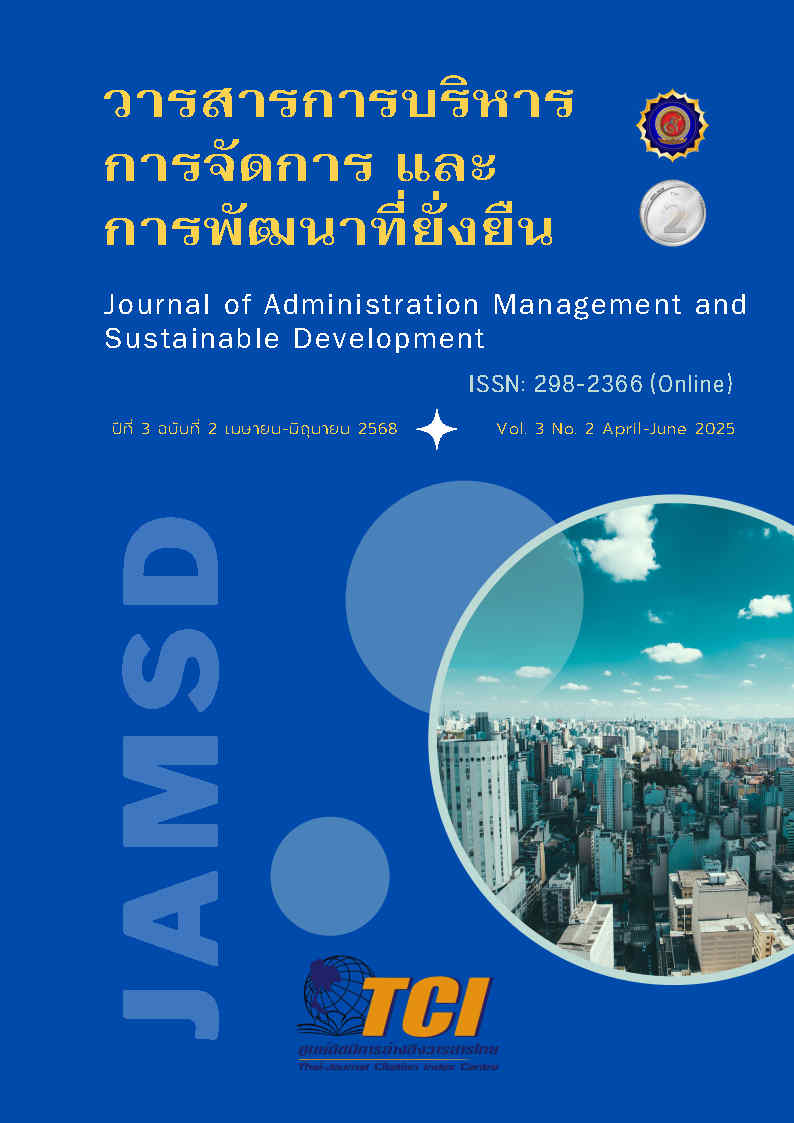The effects of task-based instruction on academic reading skills of English major students in the course: Integration of academic reading and development of English teachers association
Keywords:
task-based instruction, academic reading skills, English teachers associationAbstract
This research aimed to investigate the learning achievement after receiving instruction through a task-based teaching technique in relation to academic reading skills; to compare the academic reading skills of English major students before and after receiving instruction through the task-based teaching technique; and to examine the satisfaction of English major students toward the instructional approach employing the task-based teaching technique. The participants were 45 fourth-year English major students from Thepsatri Rajabhat University enrolled in the second semester of the academic year 2024. The research instruments included 15 instructional lesson plans with an average suitability score of 4.89; a learning achievement test comprising 6 items with a total score of 30 points and a reliability coefficient of 0.88; an academic reading skills test composed of 20 multiple-choice questions totaling 20 points, with a reliability coefficient of 0.82; and a satisfaction questionnaire divided into three aspects with 21 items, having a reliability coefficient of 0.81. The statistical methods employed were mean, standard deviation, and dependent t-test. The research findings revealed that the students’ learning achievement after receiving instruction through the task-based teaching technique was significantly higher than before the instruction at the 0.001 level of statistical significance. The comparison of academic reading skills before and after instruction also indicated that the post-instruction mean score was significantly higher than the pre-instruction score, with statistical significance at the 0.001 level across all components. Furthermore, the students’ overall satisfaction with the task-based instructional technique was at a high level.
References
บุญชม ศรีสะอาด. (2560). การวิจัยเบื้องต้น. (พิมพ์ครั้งที่ 10). กรุงเทพฯ: สุวีริยาสาส์น.
วิภาศิริ แจ้งแสงทอง. (2565). การพัฒนาผลสัมฤทธิ์ทางการเรียนในรายวิชา อส 5100303 ภาษาอังกฤษในงานอุตสาหกรรมโดยใช้เทคนิคการสอนอ่านแบบ SQ4R ของนักศึกษา คณะเทคโนโลยีอุตสาหกรรม มหาวิทยาลัยราชภัฏเทพสตรี. วารสารวิชาการคณะมนุษยศาสตร์และสังคมศาสตร์ มหาวิทยาลัยราชภัฏเทพสตรี, 13(2), 75–90. https://so01.tci-thaijo.org/index.php/truhusocjo/article/view/254053.
วิภาศิริ แจ้งแสงทอง และธมนวรรณ ตะวันนา. (2567). การพัฒนาผลสัมฤทธิ์ทางการเรียนรายวิชาภาษาอังกฤษเรื่อง Present Simple Tense โดยใช้รูปแบบการจัดการเรียนรู้แบบเน้นภาระงานเป็นฐาน (Task-Based Learning) ของนักเรียนชั้นประถมศึกษาปีที่ 6. Interdisciplinary Academic and Research Journal, 4(4), 779–794. https://doi.org/10.60027/iarj.2024.277210.
สำนักงานเลขาธิการสภาการศึกษาแห่งชาติ. (2560). แผนการศึกษาแห่งชาติ พ.ศ. 2560–2579. สำนักงานเลขาธิการสภาการศึกษาแห่งชาติ กระทรวงศึกษาธิการ. https://office2021.ksed.go.th/wp-content/uploads/2020/12/แผนการศึกษาแห่งชาติ-พ.ศ.2560-2579.pdf.
Boone, H. N., & Boone, D. A. (2012). Analyzing Likert Data. The Journal of Extension, 50(2), Article 48. https://doi.org/10.34068/joe.50.02.48.
Cronbach, L. J. (1990). Essentials of psychological testing (5th ed.). Harper & Row.
Ellis, R. (2019). Task-based language teaching. John Benjamins Publishing Company.
Fitz-Gibbon, C. T., & Morris, L. L. (1987). How to design a program evaluation (2nd ed.). Sage Publications.
Garton, S., & Copland, F. (Eds.). (2018). The Routledge handbook of teaching English to young learners. Routledge.
González-Lloret, M., & Ortega, L. (2021). Technology-mediated TBLT: Integrating tasks and technology in language education. Language Teaching Research, 25(3), 345–367.
Grabe, W., & Stoller, F. L. (2019). Teaching and researching: Reading (3rd ed.). Routledge.
Krashen, S. D., & Terrell, T. D. (1998). The natural approach: Language acquisition in the classroom. Prentice Hall Europe. https://www.sdkrashen.com/content/books/the_natural_approach.pdf.
Krathwohl, D. R. (2002). A Revision of Bloom’s Taxonomy: An Overview. Theory Into Practice, 41(4), 212–218. https://doi.org/10.1207/s15430421tip4104_2
Kuder, G. F., & Richardson, M. W. (1937). The theory of the estimation of test reliability. Psychometrika, 2(3), 151–160.
Richek, M. A., List, L. K. & Lerner, J. W. (1989). Reading Problems: Assessment and Teaching Strategies (2nd ed.). Prentice-Hall.
Richards, J. C., & Rodgers, T. S. (2014). Approaches and methods in language teaching (3rd ed.). Cambridge University Press.
Sarani, A., & Farzaneh Sahebi, L. (2012). The impact of task-based approach on vocabulary learning in ESP courses. English Language Teaching, 5(10), 118–128. http://dx.doi.org/10.5539/elt.v5n10p118.
Shintani, N. (2011). Task-based language teaching versus traditional production-based instruction: Do they result in different classroom processes? University of Sydney Papers in TESOL, 6, 97–120.
Willis, D., & Willis, J. (2007). Doing task-based teaching. Oxford: Oxford University Press.
Willis, J. (1996). A framework for task-based learning. London: Longman.
Yu, H.-q. (2007). Application of TBT in reading class. US-China Education Review, 4(5), 39–42.






